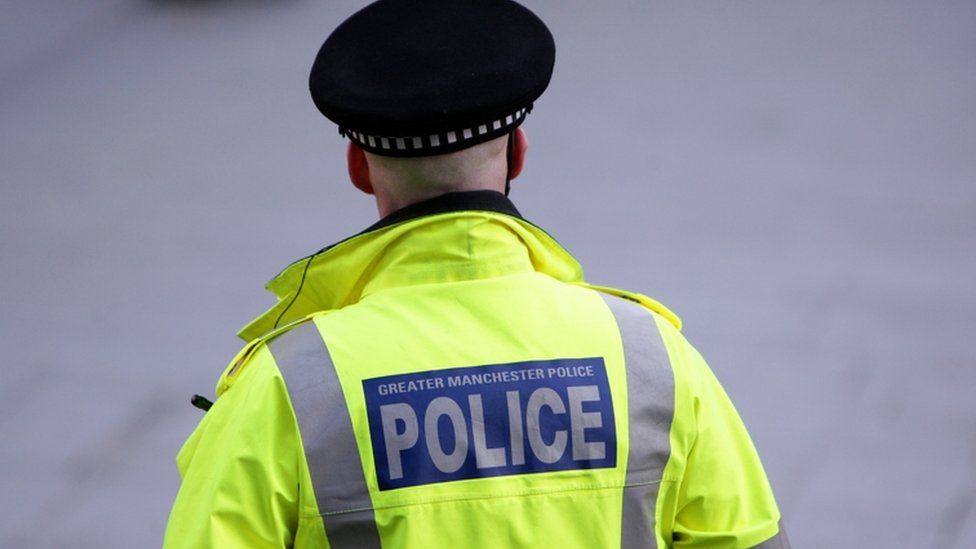Greater Manchester Police officers allege force failing crime victims

“I wouldn’t feel confident reporting a crime to my own police force.”
These are the words of a serving Greater Manchester Police (GMP) officer who has chosen to speak to BBC Newsnight to allege serious failings within England’s second largest force.
A number of officers, past and present, have also come forward to voice similar concerns.
In December, Her Majesty’s Inspectorate of Constabulary and Fire & Rescue Services (HMICFRS) found GMP failed to record about 80,000 crimes in a 12-month period and closed cases without proper investigation.
Former chief constable Ian Hopkins resigned after the force was placed in special measures, and successor Stephen Watson told a recent press conference vital improvements would be made rapidly.
“That is not to say GMP is a failing force,” he said. “It is a force comprised of many thousands [of] genuinely hard-working, committed, brave, talented, professional people.”
Former GMP officer Scott Winters said he could not wait to leave the force in 2017 after 28 years of service.
In 2015, he took the force to an employment tribunal, later reaching an out-of-court settlement.
He claimed the force he loved working for had become one that put its reputation ahead of tackling problems.
Mr Winters described the police watchdog’s findings as “dire”, “unforgivable” and “abysmal”.
And it is the public who suffer as a result, he said, with victims being let down.
“They are a victim of crime and they’ve not either had the crime recorded [or] a chance of the perpetrators being brought to justice and punished,” Mr Winters said.
Some serving police officers say the situation within GMP has not improved, either.
One, who asked to remain anonymous, told Newsnight that criminals “are luckier now” as they are “literally walking the streets [and] not being arrested”.
Almost two years ago, Patricia (not her real name) walked into Rochdale police station with her daughter who had finally found the courage to report allegations that a man had groomed and raped her.
Her daughter had been so desperate that she had twice tried to take her own life.
“We went in and the detective we spoke to already had a pile of papers on his desk and a photograph,” said Patricia.
“He asked us ‘is this the man in question?’ and we said ‘yes’ and he said ‘yeah, we know a lot of stuff about this man’.
“So I just thought: ‘Brilliant, they already know who he is so it will be dealt with really, really well’.
“My daughter gave a really lucid account, and at one point I had to leave the room because I couldn’t hear what had happened, what he had done. I just couldn’t bear it.”
‘Absolutely incompetent’
But her daughter would then have to go on to retell the distressing account again. Since making the report, four different officers have been in charge of the case.
The phone her daughter handed in as evidence also temporarily went missing.
“To me they are absolutely incompetent, there’s no other word to sum them up,” Patricia said.
“What this man did has ruined probably the best years of her life,” said Patricia.
“It’s given her such bad anxiety that she’s on antidepressants. Maximum dose. She can’t sleep. She’s just not the girl she used to be.
“He’s caused all that and he’s still out there. He’s not even been arrested.”
The family are being supported by the Maggie Oliver Foundation for victims of sexual violence after not receiving the response they expected from the police.
Many have pointed to GMP’s new computer system, which went live two years ago, as the catalyst of some of the failings.
Called the Integrated Operational Policing System (iOPS), it has been dubbed iFLOPS by many insiders.
Until last year, Paul Bailey was a GMP detective working on major incidents. He remembers the frustrations of using iOPS.
“It felt like it had been designed by someone who had never been a police officer and never worked on the streets,” he said.
“A simple example is if there was intelligence regarding firearms at an address or premises and officers were sent to that address and didn’t know that, then maybe the outcome could be a poor one for everyone involved.”
Source: (BBC News)

